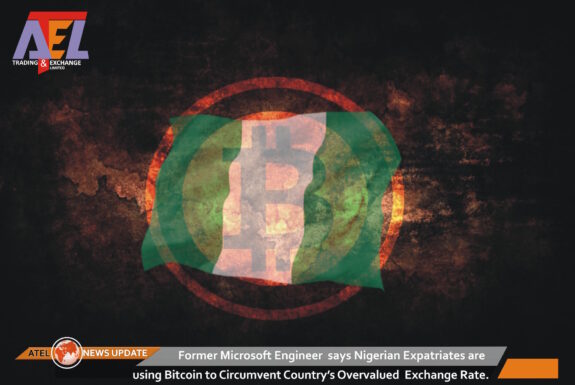A former Microsoft software engineer and co-founder of Buycoins Africa Tomiwa Lasebikan says some Nigerians expatriates are now using bitcoin to circumvent the country’s overvalued exchange rate when sending remittances.
According to Lasebikan, the Central Bank of Nigeria (CBN)’s fixed exchange rate of $1:380 is robbing recipients 20-30% of their remittance value each time they retrieve funds. At the time of writing, the parallel exchange rate of one dollar to the Naira is 1:480, according to Abokifx.
Similarly, importers that are hamstrung by the country’s rigid foreign exchange regulations, are now resorting to bitcoin when making payments online or across borders. Speaking in an interview, Lasebikan says bitcoin has also given Nigerian residents an opportunity to pay for services or utilities that the CBN usually deems unnecessary. He says:
Another thing would be for people who want to have access to resources outside the country…You want to pay for Nexflix, Apple Music. All of the things the government is aggressively clamping down on.
The software engineer explains that Nigerian authorities had, prior to this year’s events like Endsars protests, “been oblivious to the immense potential of bitcoin.” During the lockdown period, cryptocurrency usage in Nigeria grew and the country is now ranked as one of the top cryptocurrency markets. It is events in the crypto world in the past twelve months that may have helped change the Nigerian government’s perception of cryptocurrencies.
Consequently, as Lasebikan acknowledges, officials might now want to take action to slow down the adoption of digital currencies by Nigerians. According to Lasebikan, one simple way authorities can achieve this is by clamping down on centralized crypto exchanges, enforcing more rigorous KYCs or driving crypto companies out of the traditional banking infrastructure.
Still, as Lasebikan explains, this “will not kill bitcoin or the value of bitcoin” because the “majority of crypto activities happen in informal channels.” He says any clampdown will not result in the dropping of peer to peer trading which is initiated via Whatsapp or Telegram social media chat groups.
Bitcoin trading is censorship-resistant and there is no way for Nigerian authorities to stop or reverse transactions. Awareness of this and other attributes about bitcoin means the CBN and others will not succeed in any effort to control the digital currency. For crypto users, knowing of this is reassuring and it helps to maintain or accelerate the adoption momentum.
Do you agree with Lasebikan about the immense power of bitcoin in Nigeria? Share your thoughts in the comments section below.
Disclaimer: This article is for informational purposes only. It is not an offer or solicitation of an offer to buy or sell, or a recommendation, endorsement, or sponsorship of any products, services, or companies. atelexchange.com does not provide investment, tax, legal, or accounting advice. Neither the company nor the author is responsible, directly or indirectly, for any damage or loss caused or alleged to be caused by or in connection with the use of or reliance on any content, goods or services mentioned in this article.
At Altecho Trading and Exchange Limited- ATEL, we give you news, opinions, advice and research on Crypto-currency (eCurrency, digital currency), computer/general security issues and the latest internet threats.
Credit: Terence Zimwara+Atel



